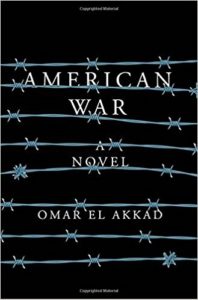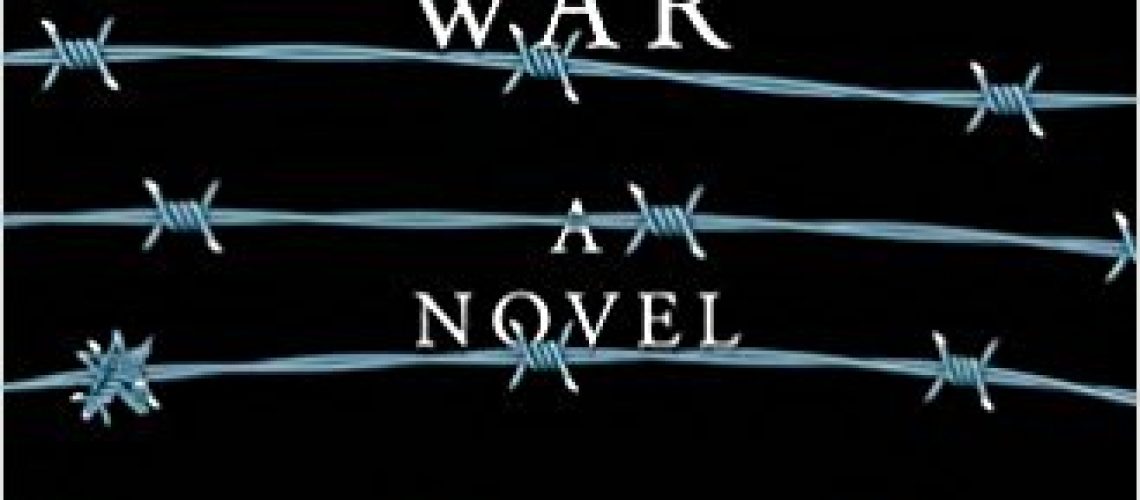It is approximately half a century in our future. Climate change has altered the coasts of the United States, wiping out much of Florida and Louisiana. Amid these changes, the Second American Civil War breaks out. While the issue of slavery drove the original Civil War, southern state refusal to accept a federal ban on fossil fuels stokes the fires of the second. Yet, the issues are more complex beyond any single cause. Georgia, Alabama, and Mississippi form a core of secession, Texas becomes reabsorbed by Mexico, and South Carolina suffers as ground zero in the release of a plague engineered by the North, leaving the state quarantined. Fracturing, the South becomes desperate, fueled by hatred. With an urge to end the last remnants of resistance as quickly as possible, the North retaliates with equal hate and ferocity.
Omar El Akkad’s American War begins with the narrator introducing us to six-year-old Sarat Chestnut, born amid this national chaos in the remains of Louisiana. This narrator, who is only identified by the close of the novel, explains that they only knew Sarat later in her life, after her innocence was lost and she had played a major role in the South getting its revenge. They feel the need to begin her story before that tragedy, before the US fell into greater ruin, before the Chestnuts lost their patriarch and the surviving family members became refugees, before Sarat fell down her personal path of despair leading her to monstrosity. And so the narrator begins with the brief, nigh unimaginable time when Sarat may actually have known peace and happiness.

As a novel that combines literary and speculative fiction, American War may be as polarizing for readers as the North/South schisms of this dystopian future, or our current political divisions. El Akkad began writing his debut novel well before the shock of the last US election hit and its resulting administration began (and continues) to erode our nation’s soul. The novel’s timely publication soon after that election bolstered its notice and success, with the horrors of its speculation suddenly a bit too close for comfort. In truth, American War is not just inspired or relevant to the current US political and social environment. It is a story born from witnessing political chaos in general; a meditative focus on the hatred that war can engender in individuals and the effects that hatred can seed. This parallels the greater weight El Akkad devotes to the literary side of his writing over its speculative nature. American War is not a speculation on what may come to America in the future, but a generic setup that happens to have America as its setting for the purposes of character study.
Although there are clear threads of plot throughout the novel, El Akkad does not develop speculative aspects particularly well; they are merely there for dystopian color. The motivations behind the outbreak of conflict over fossil fuels never receive attention, and the believability of the novel’s setup is thus rendered suspect for any questioning reader. Similarly, El Akkad gives little explanation to the science behind the biowarfare that sits both as historical background and centrally to Sarat’s ultimate actions. The antagonism and vitriol between the North and the South within American War are not granted a suitable origin story, but the intensity of the divides and the violent, immoral actions of the two sides (individually and collectively) deserve better explanation on how the situation came to such extremes. Meanwhile, historically discordant Arab and African states have united and Mexico has retaken much of the American southwest. How did all of this realistically happen in roughly fifty years? Such details aren’t important to literature, are they?
El Akkad’s American War is thus not really about America at all, and it is not in any way a noteworthy speculation on our political/cultural future, current state-of-affairs included. I find it unfortunate that publications and readers have chosen to try and fit the novel into a false mold. Because the novel is not without its merits. They just lie outside the realms of genre. For one, El Akkad writes viscerally, in a style that is both beautiful and brutal to mirror the novel’s themes. His background in journalism probably helps in the novel’s structure of past events being historically related by a narrator who is trying to maintain certain objectivity. From the opening pages it is clear that the narrator has known Sarat, yet from some kind of emotional distance that at least initially kept much of her past a secret. El Akkad achieves this voice perfectly.
Secondly, the general theme that American War is concerned with is nonetheless relevant, even if it isn’t really about America or based on sound world-building: What effects do wars have on an individual, particularly wars that tear apart a nation, tear apart families, and feed off of atrocities that commonly are termed inhuman, even though humans seem to consistently gravitate to them when times get bad. Sarat is a compellingly complex character, but she is not a likable one. Indeed, there are no particularly likable characters within the pages of this dark, cold novel. Everyone is damaged, everyone has compromised, everyone seems driven to watching the world burn.
El Akkad’s novel is a masterful coming-of-age story that shows the opposite of the hero’s journey, someone razed to ruin. Typically a mentor guides the hero at a key point of their development to help them realize their potential. Within the refugee camp Sarat meets her mentor, but the relationship becomes a twisted one where Sarat is exploited and beated down into a weapon of despair. Yet, deep within all of that brutal harshness, the reader gets a sense of some hope remaining in her. Like a Lord Vader, the good hasn’t all been driven out.
By its end American War is emotionally exhausting, with a powerful resonance. It is unfortunate that El Akkad couldn’t achieve that while also giving proper due to the speculated history his story is built from, or included more futuristic details that had made the story more believable while simultaneously serving as a more effective commentary on America. Nonetheless, those that like dark, literary character studies will likely find enough of success in American War to warrant checking it out.







